- Tour de France
- Giro d'Italia
- La Vuelta ciclista a España
- World Championships
- Milano-Sanremo
- Amstel Gold Race
- Tirreno-Adriatico
- Il Lombardia
- Liège-Bastogne-Liège
- La Flèche Wallonne
- Paris - Nice
- Paris-Roubaix
- Volta Ciclista a Catalunya
- Critérium du Dauphiné
- Tour des Flandres
- Gent-Wevelgem in Flanders Fields
- Clásica Ciclista San Sebastián
- Astana Qazaqstan Team
- Bahrain - Victorious
- Red Bull - BORA - hansgrohe
- Arkéa - B&B Hotels
- Decathlon AG2R La Mondiale Team
- EF Education-EasyPost
- Groupama - FDJ
- INEOS Grenadiers
- Alpecin-Deceuninck
- Intermarché - Wanty
- Lidl - Trek
- Movistar Team
- Soudal - Quick Step
- Team dsm-firmenich PostNL
- Team Jayco AlUla
- Team Visma | Lease a Bike
- UAE Team Emirates
- Grand tours
- Top competitors
- Final GC favorites
- Stage profiles
- Riders form
- Countdown to 4 billion pageviews
- Favorite500
- Profile Score
- Terminology list
- Statistics by season
- World map of rider races
- Most starts by race
- Starts and results
- Injury history
- Contribute info
- Submit program
- Contribute sites / social media
- Embed rider results
- Top GC results
- Overview - Overview
- Statistics - Statistics
- Results - Results
- Calendar - Calendar
- More - More
- Specialties - Specialties

Eddy Merckx
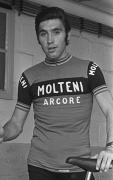
Points per specialty
- 21379 Onedayraces
- 18184 Sprint
- 6054 Climber
- Cyclo-cross
- Visits: ▼705 this week
Top results
- 5x GC Tour de France ('74, '72, '71, '70, '69)
- 34x stage Tour de France ('75, '74, '72, '71, '70, '69)
- 5x GC Giro d'Italia ('74, '73, '72, '70, '68)
- 7x Milano-Sanremo ('76, '75, '72, '71, '69, '67, '66)
- 3x World Championships ME - Road Race ('74, '71, '67)
- 24x stage Giro d'Italia ('74, '73, '72, '70, '69, '68, '67)
- 5x Liège - Bastogne - Liège ('75, '73, '72, '71, '69)
- 3x GC Paris-Nice ('71, '70, '69)
- 3x Paris - Roubaix ('73, '70, '68)
- 3x La Flèche Wallonne ('72, '70, '67)
- 3x Gent-Wevelgem ('73, '70, '67)
- 21x stage Paris-Nice ('77, '75, '74, '73, '72, '71, '70, '69, '67)
- Retired since 1978-05-17
- 1978 C&A until 17/05
- 1976 Molteni - Campagnolo
- 1975 Molteni
- 1974 Molteni
- 1973 Molteni
- 1972 Molteni
- 1971 Molteni
- 1970 Faema - Faemino
- 1967 Peugeot - Michelin - BP
- 1966 Peugeot - Michelin - BP
- 1965 Solo - Superia
Key statistics
- 279 Wins GC (46) Oneday races (79) ITT (69)
- 16 Grand tours tour (7) giro (8) vuelta(1)
- 51 Classics RBX(12) MSR(10) RVV(10) LBL(10) LOM(9)
PCS Ranking position per season
- Axel Merckx (Son)
H2H Suggestions
- POGAČAR Tadej
- GIMONDI Felice
- ZOETEMELK Joop
- POULIDOR Raymond
Grand Tours
- Vuelta a España
Major Tours
- Volta a Catalunya
- Tour de Romandie
- Tour de Suisse
- Itzulia Basque Country
- Milano-SanRemo
- Ronde van Vlaanderen
Championships
- European championships
Top classics
- Omloop Het Nieuwsblad
- Strade Bianche
- Gent-Wevelgem
- Dwars door Vlaanderen
- Eschborn-Frankfurt
- San Sebastian
- Bretagne Classic
- GP Montréal
Popular riders
- Tadej Pogačar
- Wout van Aert
- Remco Evenepoel
- Jonas Vingegaard
- Mathieu van der Poel
- Mads Pedersen
- Primoz Roglic
- Demi Vollering
- Lotte Kopecky
- Katarzyna Niewiadoma
- PCS ranking
- UCI World Ranking
- Points per age
- Latest injuries
- Youngest riders
- Grand tour statistics
- Monument classics
- Latest transfers
- Favorite 500
- Points scales
- Profile scores
- Reset password
- Cookie consent
About ProCyclingStats
- Cookie policy
- Contributions
- Pageload 0.0678s

The mountains are calling and I must go
Milestones: Eddy Merckx & the Tour de France that Almost Wasn’t
On the evening of Saturday June 28, 1969, a young Belgian cyclist just 24 years of age, dressed in the white and red colors of the Faema squad and wearing dossard #51, took his place on the start-line of the 56 th Tour de France in the northern town of Roubaix on the border between France and Belgium; his first appearance. He would not win the Prologue time-trial that day, finishing second to Rudi Altig of the Salvarani team.
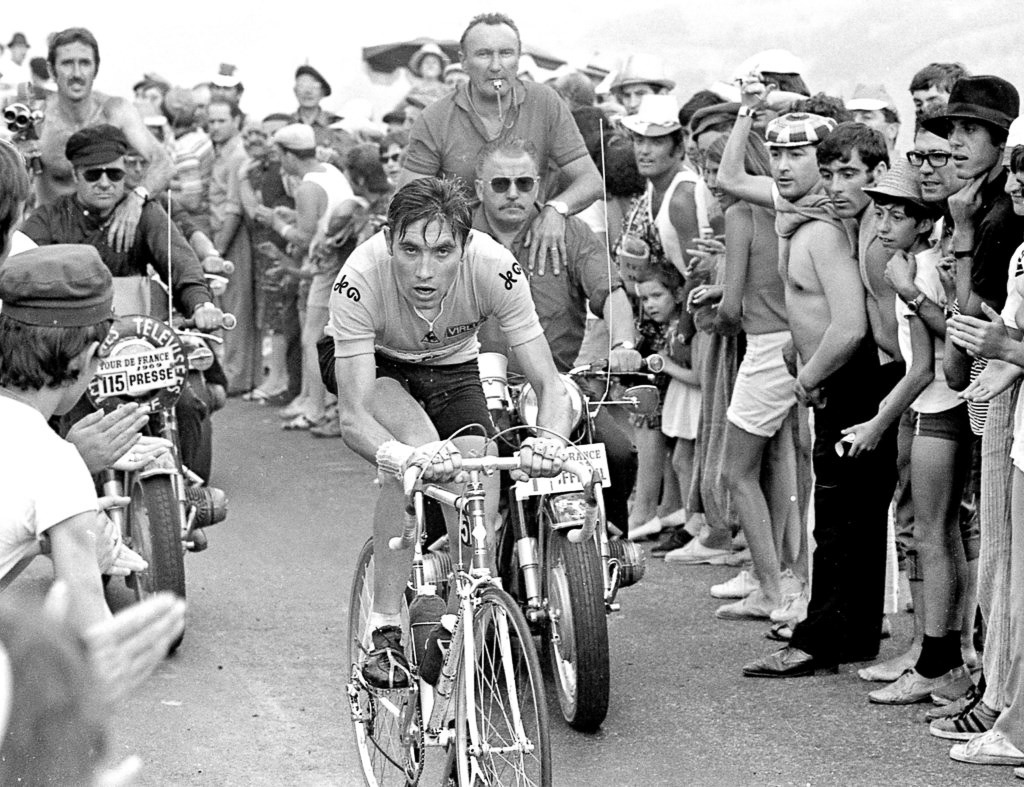
22 days later, on Sunday July 20, 1969, Edouard Louis Joseph Merckx—commonly known as “Eddy”—would step onto the top step of the final podium in Paris as the General Classification winner of the Tour de France in his first attempt, wearing the maillot jaune for a total of 19 of those days and winning 6 individual stages in the process, as well as being part of the Stage 1b team time trial winning squad.
Merckx would also finish in Paris as the winner of the Points Classification, the King of the Mountains Classification, the Combination Classification and the overall Combativity Prize. This was the first and only time that a single rider won all of the major classifications at the Tour de France. If it had been an official classification at the time, he would have also won the Best Young Rider award for those riders under the age of 26.
Fifty years later, Merckx’s Tour de France record is well-known, becoming the second rider to win the Tour a total of 5 times—a feat which had only been accomplished by Jacques Anquetil prior to Merckx’s career—collecting a total of 34 stage wins and wearing the maillot jaune a total of 96 days in the process, both of which are records which have yet to be broken. He also amassed 5 wins in the Giro d’Italia and 1 win in the Vuelta, giving him 11 total victories in the Grand Tours, another record which has yet to be broken.
And yet, Merckx almost didn’t start the Tour that late June evening in 1969, and who knows what his career would have looked like had he not.
In 1967, while riding for the Peugeot-BP-Michelin squad, Merckx raced in the Giro d’Italia, finishing 9 th overall, with two stage wins.
Later that summer, his Peugeot teammate Tom Simpson died on Mont Ventoux at the 1967 Tour de France, due to heat exhaustion exacerbated by amphetamines and alcohol. While Merckx was not at that Tour, when the news flashed across his television set during the evening news, Merckx became distraught. Simpson had been a friend and mentor to the young Belgian, unlike the hostility that Merckx had faced from his previous team leader Rik van Looy. He immediately decided to attend the funeral in England, the only rider from the European continent to do so. To this day Merckx is saddened that Simpson’s name is so closely associated with doping, rather than for the Briton’s accomplishments while alive.
After Simpson’s death, the Union Cycliste Internationale (UCI), which is the governing body of the sport of cycling, implemented mandatory doping controls for the 1968 season. The 1968 Giro d’Italia would be the first major Tour to have regular testing, with results to be announced 15 days after the conclusion of the race.
After switching to the Faema team from Peugeot in the off-season, Merckx won the Giro d’Italia—his first of 11 total Grand Tour victories—taking another 3 stage wins. On June 15, 1968, the Italian Cycling Federation announced that 9 riders returned positive tests during the race. Merckx was not one of the offending riders.
Riders testing positive included Italian stars Felice Gimondi and Gianni Motta, along with Gimondi, Motta, Franco Balmamion, Franco Bodrero, Raymond Delise, Peter Abt, Victor van Schil, Mariano Diaz, and Joaquin Galera. Balmamion’s result was thrown out, as the substance he tested positive for had yet to be officially banned.
Gimondi’s ban was overturned on July 15, because he claimed he had just used Reactivan, an over-the-counter stimulant appetite suppressant containing fencamfamine, which has similar properties to amphetamines but at about half the strength. At that time, Reactivan was still in the grey area between legal and illegal drugs. With the exception of Balmamion, all of the riders with positive tests served a ban of at least 30 days.
In 1969, Merckx started the Giro d’Italia as the overwhelming favorite, and by the rest day on May 31, he had won an additional 4 stages and wore the maglia rosa —the pink jersey—as the General Classification leader. Then his world fell apart.

On Sunday June 1, after the 16 th stage from Parma to Savona won by Roberto Ballini, Merckx was called to Doping Control as the leader of the race. The following morning, Monday June 2, 1969, it was announced that Merckx’s test came back positive for fencamfamine, the same substance that Gimondi had used in 1968. Giro organizer Vincenzo Torriani was forced to exclude him from the remainder of the race, with no right to appeal.
Controversially, the results of the test were announced to the press even before Merckx himself had been informed; the Faema team director Vincenzo Giacotto and Vincenzo Torriani were accompanied by RAI Television crew, along with two reporters—Bruno Raschi from La Gazzetta dello Sport and Théo Mathy, from the Belgian RTBF television.
Immediately after the announcement, Merckx was interviewed by RAI’s Sergio Zavoli in a state of collapse, lying on his bed in Room 11 of the Hotel Excelsior in Albisola Marina, sobbing in French, “I don’t know what to say. I am sure I took nothing. I’m sure of it. I don’t understand anything.” It was the first time that a race leader had been found positive and kicked out of any of the major stage races.

The offense also came with an automatic 30-day suspension, which in this case would not expire until July 2, 4 days after the Tour de France was due to start in Roubaix, meaning he would not be allowed to start. It was a crushing blow. Merckx was convinced that it meant the end of his career, and that he was going to be sacked by his Faema squad.
Almost immediately thereafter, Merckx’s supporters began a campaign to have his ban overturned; even much of the Italian media felt that Merckx was the victim of some sort of conspiracy to keep him from winning the Giro d’Italia for a second straight year. The Italian newspaper La Stampa went so far as to call the scandal a “requiem for cycling,” while the headline in the Corriere dello Sport said that “Il ciclismo si sta suicidando (cycling is commiting suicide).” Bruno Raschi’s report for La Gazzetta dello Sport concluded “I can believe that they’ve found Merckx drugged, but I’m sure that someone put the dope in his broth.”
Two days previously, an unnamed support rider on Felice Gimondi’s Salvarani team allegedly knocked on Merckx’s hotel room and offered him a briefcase full of money to throw the Giro, and allow Gimondi to win, which Merckx declined.
Because of this, suspicions were tossed around that Merckx had been intentionally drugged by someone spiking his food or drink with fencamfamine, or that his test samples had been tampered with, in order to get him thrown out of the Giro.
While situations like this seem less plausible in the modern era, in the early days of drug-testing, this was entirely possible. Riders would often accept hand-ups of food or drink from spectators on the side of the road. Teams did not travel with their own chefs or food supplies, and thus had less control over what they ate and drank at meals.
In fact, the entire drug-testing process was still in its infancy; it had been less than two years since Tom Simpson died at the 1967 Tour de France. Despite Simpson’s death, many still questioned whether testing was necessary at all. No real standards had yet to be implemented; not even something as basic as establishing a set list of banned substances, nor guidelines for counter-analysis of B-samples after a positive result.
At the 1969 Giro, testing was done in a mobile lab which followed the race from stage to stage; test equipment was not always well secured and could be knocked out of calibration by jostling and shocks from poor roads. Samples were also not sealed and secured in the same manner as they are today, so it is entirely possible that the samples were indeed tampered with.
Merckx also had the support of the Belgian government, which issued a statement stating the that accusations “were without foundation” and that he was the “sacrificial victim of a criminal plot.” Merckx’s wife Claudine later estimated that her husband received over 10,000 letters of support, which took until the end of the Tour de France to answer them all, after enlisting the help of friends, family, and neighbors.
On June 14, 1969, the Fédération Internationale du Cyclisme Professionnel (FICP), which governed the sport of professional cycling under the auspices of the UCI, convened an extradordinary meeting in Brussels, after which they released a communiqué stating that they:
- Accepted the results of the tests carried out by the Italian doctors
- Granted that the Italian Pro Cycling Union (UICP) had the right to suspend Merckx based on the test results
- Considered the “irreproachable record of the incriminated rider” and the negative results of tests that he had undergone in the past
- Doubted that Merckx voluntarily intended to dope, and
- Gave him the “bénéfice du doute” or “benefit of the doubt” and lifted his sanctions effective immediately.
This meant that Merckx would indeed be able to start the Tour de France just 2 weeks later, but also triggered many protests that he was being given preferential treatment because he was Eddy Merckx, not because he was innocent. At the Tour of Luxembourg, riders staged a mini-strike to express their discontent. 1968 Tour de France winner Jan Janssen declared that “the decision was an injustice towards … lots of little riders who were punished without being able to defend themselves.”
Merckx was also not entirely happy about the wording of the communiqué, as he felt that those 3 words (“bénéfice du doute”) were vague. They didn’t establish guilt or innocence, which meant that Merckx would always have that positive test hanging over his head.
Walter Godefroot, one of Merckx’s friends and rivals on the Flandria squad, knew that Merckx was never more dangerous than when he was down. “When everyone else is hurting, they slow down. When Merckx is in trouble, he attacks,” says Godefroot and so it was.
Merckx had been deeply wounded by the scandal and by the controversy surrounding its outcome, and threw himself into training over the next 14 days after being cleared to race; even riding à bloc for 40 kilometers on the morning of the Tour prologue, tranquille for another 40 kilometers in the afternoon, and then preparing for the prologue time trial that evening in Roubaix.
Merckx was always a prolific winner, but before the Savona affair, he raced with joy. He loved being on the bike, and he loved winning. But afterwards, Merckx lost his innocence and trust in people and the system around him. From that point forward, he always raced as if he had something to prove, which in a sense he did. Every time he won a race and was tested for doping, in his mind each negative test was another piece of evidence that he didn’t need to dope in order to win.
It was during the 1969 Tour after one of Merckx’s 6 stage wins, that Brigitte Raymond, the young daughter of Merckx’s former teammate Christian Raymond, asked her father why Merckx always had to win. When the elder Raymond said that it was because Merckx was the best, Brigitte replied, “well, he’s a real cannibal then.” Her father found this amusing and relayed the story to a couple of journalists. The nickname stuck. From 1969 forward, Merckx was known as “The Cannibal”.
The rest is history.
The information included in this article came from the following sources:
- Brunel, Philippe. Merckx: intime , (France: Calmann-Lévy, 2002).
- Fotheringham, William. Half Man, Half Bike: The life of Eddy Merckx, Cycling’s Greatest Champion , (Chicago: Chicago Review Press, 2013).
- Friebe, Daniel. Eddy Merckx: The Cannibal , (United Kingdom: Ebury Press, 2012).
- Strouken, Tonny & Maes, Jan. Merckx 69: Celebrating the world’s greatest cyclist in his finest year , (United Kingdom: Bloomsbury Sport, 2015).
- Vanwalleghem, Rik. Eddy Merckx: The Greatest Cyclist of the Twentieth Century , (Boulder: VeloPress, 1996).
Originally published in the Late Summer 2019 edition of Cycling West magazine.
Share this:
1973 Tour de France
60th edition: june 30 - july 22, 1973, results, stages with running gc, map, videos and photos.
1972 Tour | 1974 Tour | Tour de France database | Quick Facts | Final GC | Stage Results with Running GC | Photos from the 1973 Tour de France | Video of the 1973 Tour

1973 Tour de France Route Map

Les Woodland's book The Olympics' 50 Craziest Stories: A Five Ring Circus is available in print, Kindle eBook & audiobook versions. To get your copy, just click on the Amazon link on the right.
1973 Tour de France Quick Facts:
4,140.4 km raced at an average speed of 33.918 km/hr
132 starters and 87 classified finishers
After winning both the Vuelta and the Giro in 1973, Eddy Merckx chose not to defend his Tour title.
His contract with sponsor Molteni called for his riding both the Giro d'Italia and the Vuelta a España (then held in the spring) that year.
With two Grand Tours under his belt, Merckx intelligently thought a third three-week race would be too much.
Luis Ocaña effectively won the 1973 Tour on the cobbles of stage three when he left his major challengers more than two minutes behind.
He sealed the deal in the brutal eighth stage with its four massive climbs where he and José-Manuel Fuente fought so hard the next finisher, Mariano Martinez, came in seven minutes later.
Complete Final 1973 Tour de France General Classification:
- Bernard Thévenet (Peugeot-BP) @ 15min 51sec
- José-Manuel Fuente (KAS) @ 17min 15sec
- Joop Zoetemelk (Gitane-Frigécrème) @ 26min 22sec
- Lucien van Impe (Sonolor) @ 30min 20sec
- Herman Van Springel (Rokado) @ 32min 1sec
- Michel Périn (Gan-Mercier) @ 33min 2sec
- Joaquim Agostinho (Bic) @ 35min 51sec
- Vicente López-Carril (KAS) @ 36min 18sec
- Régis Ovion (Peugeot-BP) @ 36min 59sec
- Raymond Delisle (Peugeot-BP) @ 37min 43sec
- Mariano Martinez (Gan-Mercier) @ 40min 49sec
- Pedro Torres (Las Casera-Bahamontes) @ 47min 30sec
- José Catieau (Bic) @ 49min 12sec
- Antonio Martos (KAS) @ 49min 20sec
- Antoon Houbrechts (Rokado) @ 49min 38sec
- Lucien Aimar (De Kova-Lejeune) @ 49min 54sec
- Fernando Mendes (Carpenter-Shimano-Flandria) @ 51min 22sec
- Leif Mortensen (Bic) @ 52min 18sec
- Francisco Galdos (KAS) @ 53min 5sec
- Bernard Labourdette (Bic) @ 1hr 4min 49sec
- Jean-Pierre Danguillaume (Peugeot-BP) @ 1hr 8min 41sec
- Luis Zubero (KAS) @ 1hr 18min 49sec
- Ronald Dewitte (Carpenter-Shimano-Flandria) @ 1hr 19min 18sec
- Luis Balague (Las Casera-Bahamontes) @ 1hr 20min 11sec
- René Grelin (Gan-Mercier) @ 1hr 20min 33sec
- Jean-Claude Genty (Bic) @ 1hr 21min 6sec
- Roland Berland (Bic) @ 1hr 22min 7sec
- Santiago Lazcano (KAS) @ 1hr 25min 27sec
- Pierre Martelozzo (Peugeot-BP) @ 1hr 27min 51sec
- Alain Santy (Bic) @ 1hr 29min 19sec
- Johnny Schleck (Bic) @ 1hr 34min 19sec
- José Martins (Canada Dry-Gazelle) @ 1he 34min 36sec
- Michel Pollentier (Carpenter-Shimano-Flandria) @ 1hr 36min 3sec
- Raymond Martin (Gitane-Frigécrème) @ 1hr 36min 10sec
- Charly Rouxel (Peugeot-BP) @ 1hr 47min 42sec
- Jurgen Tschan (Peugeot-BP) @ 1hr 49min 20sec
- Damaso Torres (La Casera-Bahamontes) @ 1hr 49min 23sec
- Jesus Manzaneque (La Casera-Bahamontes) @ 1hr 51min 40sec
- Antonio Menedez (KAS) @ 1hr 55min 58sec
- Carlos Melero (KAS) @ 1hr 58min 7sec
- Ferdinand Julien (Gitane-Frigécrème) @ 2hr 1min 12sec
- Barry Hoban (Gan-Mercier) @ 2hr 3min 0sec
- Marcel Boishardy (De Kova-Lejeune) @ 2hr 3min 38sec
- Herculano Oliveira (Canada Dry-Gazelle) @ 2hr 5min 13sec
- Jean-Pierre Genet (Gan-Mercier) @ 2hr 7min 14sec
- José-Antonio González (KAS) @ 2hr 8min 7sec
- Claude Tollet (Sonolor) @ 2hr 9min 4sec
- Jean-Claude Largeau (Gitane-Frigécrème) @ 2hr 9min 22sec
- José Grande (KAS) @ 2hr 9min 40sec
- Michel Roques (Sonolor) @ 2hr 10min 41sec
- Albert Van Vlierberghe (Rokado) @ 2hr 13min 2sec
- Sylvain Vasseur (Bic) @ 2hr 13min 56sec
- Jesus Esperanza (La Casera-Bahamontes) @ 2hr 14min 49sec
- Daniel Ducreux (Carpenter-Shimano-Flandria) @ 2hr 15min 21sec
- Robert Bouloux (Peugeot-BP) @ 2hr 15min 55sec
- Michael Wright (Gitane-Frigécrème) @ 2hr 23min 21sec
- Christian Blain (De Kova-Lejeune) @ 2hr 23min 35sec
- Gerard Vianen (Gitane-Frigécrème) @ 2hr 24min 21sec
- Willy Teirlinck (Sonolor) @ 2hr 24min 44sec
- Gérard Besnard (Sonolor) @ 2hr 28min 25sec
- Jean-Jacques Sanquer (Carpenter-Shimano-Flandria) @ 2hr 29min 5sec
- Alain Nogues (Gitane-Frigécrème) @ 2hr 33min 41sec
- Joaquim Andrade (Gitane-Frigécrème) @ 2hr 34min 7sec
- Walter Godefroot (Carpenter-Shimano-Flandria) @ 2hr 34min 49sec
- Gustaaf Van Roosbroeck (Rokado) @ 2hr 38min 2sec
- Charly Grosskost (Gan-Mercier) @ 2hr 38min 43sec
- Jacques Esclassan (Peueot-BP) @ 2hr 42min 3sec
- André Mollet (Peugeot-BP) @ 2hr 43min 5sec
- Theo Van Der Leeuw (Canada Dry-Gazelle) @ 2hr 43min 38sec
- Jacques Botherel (Sonolor) @ 2hr 45min 45sec
- Marc Demeyer (Carpenter-Shimano-Flandria) @ 2hr 46min 8sec
- Francis Campaner (Gitane-Frigécrème) @ 2hr 47min 21sec
- Wilfried David (Carpenter-Shimano-Flandria) @ 2hr 50min 33sec
- Jan Krekels (Canada Dry-Gazelle) @ 2hr 54min 39sec
- Jacques Mourioux (Gan-Mercier) @ 2hr 59min 21sec
- Guy Santy (Bic) @ 3hr 1min 19sec
- Raymond Riotte (Sonolor) @ 3hr 4min 24sec
- Gérard Moneyron (Gan-Mercier) @ 3hr 5min 20sec
- Robert Mintkiewicz (Sonolor) @ 3hr 7min 58sec
- Alf Gaida (Rokado) @ 3hr 12min 23sec
- Régis Delépine (Gan-Mercier) @ 3hr 14min 21sec
- Charles Genthon (De Kova-Lejeune) @ 3hr 42min 20sec
- Noël Geneste (De Kova-Lejeune) @ 4hr 17min 31sec
- Jean-Claude Baud (De Kova-Lejeune) @ 4hr 33min 9sec
- Jean-Claude Boucher (De Kova-Lejeune) @ 4hr 36min 56sec
- Jacques Hochart (De Kova-Lejeune) @ 4hr 51min 9sec
Climbers' Competition:
- José-Manuel Fuente (KAS): 216
- Luis Ocaña (Bic): 192
- Bernard Thévenet (Peugeot-BP): 119
- Lucien Van Impe (Sonolor): 107
- Joop Zoetemelk (Gitane-Frigécrème): 83
- Vicente Lopez-Carril (KAS): 80
- Joaquim Agostinho (Bic): 46
- Francisco Galdos (KAS): 46
- Mariano Martinez (Gan-Mercier): 38
Points Competition:
- Joop Zoetemelk (Gitane-Frigécrème): 168
- Luis Ocaña (Bic): 145
- Bernard Thévenet (Peugeot-BP): 139
- Walter Godefroot (Carpenter-Shimano-Flandria): 139
- Barry Hoban (Gan-Mercier): 110
- Gerard Vianen (Gitane-Frigécrème): 110
- Lucien Van Impe (Sonolor): 109
- Mariano Martinez (Gan-Mercier): 89
- Jacques Esclassan (Peugeot-BP): 89
- Bic: 369hr 31min 55sec
- Peugeot-BP @ 20min 23sec
- KAS @ 20min 42sec
- Gan-Mercier @ 23min 4sec
- Rokado @ 1hr 40min 42sec
- Sonolor @ 1hr 45min 45sec
- Gitane-Frigécrème @ 1hr 58min 57sec
- La Casera-Bahamontes @ 2hr 1min 50sec
- Carpenter-Shimano-Flandria @ 2hr 9min 21sec
- De Kova-Leujeune @ ?
- Canada Dry-Gazelle @ ?

Content continues below the ads
Stage results with running GC:
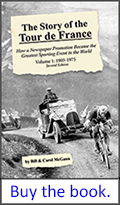
Prologue: Saturday, June 30, Scheveningen (Netherlands) 7.1 km Individual Time trial
- Joop Zoetemelk: 9min 58.37sec
- Raymond Poulidor @ 1sec
- Jesus Manzaneque s.t.
- Herman Van Springel s.t.
- Luis Ocaña @ 2sec
- Georges Pintens s.t.
- Yves Hézard @ 4sec
- Charly Grosskost @ 5sec
- José-Luis Viejo s.t.
- Cyrille Guimard @ 7sec
GC after Prologue: Places and times same as prologue results
Stage 1A: Sunday, July 1, Scheveningen - Rotterdam, 84 km
- Willy Tierlinck: 1hr 47min 44sec
- Willy De Geest s.t.
- Robert Montkiewicz s.t.
- Jurgen Tschan s.t.
- Alain Nogues s.t.
- Gérard Vianen s.t.
- Leif Mortensen s.t.
- Antonio Menendez s.t.
- Ludo Delcroix s.t.
- Sylvain Vasseur s.t.
GC after Stage 1A:
- Willy Tierlinck: 1hr 57min 51sec
- Gérard Vianen @ 6sec
- Alain Nogues @ 11sec
- Jurgen Tschan @ 14sec
- Leif Mortensen @ 16sec
- Gustaaf Van Cauter @ 17sec
- Tino Tabak @ 17sec
- Ludo Delcroix @ 20sec
- Carlos Melero @ 24sec
Stage 1B: Sunday, July 1, Rotterdam - St. Niklaas (Belgium), 137.5 km
- José Catieau: 3hr 33min 41sec
- Herman Van Springel @ 1sec
- Gonzalo Aja @ 2min 12sec
- Michel Périn s.t.
- Mat De Koning @ 2min 17sec
- Gustaaf Van Roosbroeck @ 2min 24sec
- Albert Van Vliergerghe s.t.
- Frans Verbeeck s.t.
- Barry Hoban s.t.
- Marc De Meyer s.t.
GC after Stage 1B:
- Herman Van Springel: 5hr 32min 8sec
- José Catieau @ 30sec
- Willy Tierlinck @ 1min 48sec
- Willy De Geest @ 1min 50sec
- Gérard Vianen @ 1min 54sec
- Alain Nogues @ 1min 59sec
- Jurgen Tschan @ 2min 2sec
- Leif Mortensen @ 2min 4sec
- Gustaaf Van Cauter @ 2min 5sec
- Tino Tabak @ 2min 6sec
Stage 2A: Monday, July 2, St. Niklaas 12.4 km Team Time Trial
Time was calculated by adding up the times of the first five riders of each team. Stage was for Team GC, times were not applied to individual GC.
- Watney-Maes: 1hr 12min 29sec
- Peugeot-BP @ 44sec
- KAS @ 52sec
- Rokado s.t.
- Bic @ 59sec
- Carpenter-Shimano-Flandira @ 1min 24sec
- Gitane-Frigicreme @ 1min 47sec
- Sonolor @ 1min 48sec
- La Casera-Bahamontes @ 2min 44sec
- Gan-Mercier @ 3min 10sec
- Canada Dry-Gazelle @ 3min 25sec
- De Kova-Lejeune @ 7min 51sec
GC after Stage 2A:
Stage 2B: Monday, July 2, St. Niklaas - Roubaix, 138 km
- Eddy Verstreaten: 3hr 34min 49sec
- Gérard Vianen @ 7sec
- Fernando Mendes s.t.
- Charly Rouxel s.t.
- Régis Delépine s.t.
- Walter Godefroot @ 24sec
- Jacques Mourioux s.t.
- Cyrille Guimard s.t.
- Jan Krekels s.t.
GC after Stage 2B:
- Herman Van Springel: 9hr 7min 21sec
- Gérard Vianen @ 1min 27sec
- Willy Tierlinck @ 1min 44sec
- Jurgen Tschan @ 1min 56sec
- Eddy Verstraeten @ 1min 58sec
Stage 3: Tuesday, July 3, Roubaix - Reims, 226 km
- Cyrille Guimard: 5hr 41min 54sec
- Gustaaf Van Roosbeck s.t.
- Juan Zurano s.t.
- Luis Ocaña s.t.
- José Catieau s.t.
- Frans Verbeeck @ 2min 34sec
GC after Stage 3:
- José Catieau: 14hr 49min 45sec
- Willy De Geest @ 1min 16sec
- Leif Mortensen @ 1min 34sec
- Cyrill Guimard @ 1min 43sec
- Luis Ocaña @ 1min 59sec
- Herman Van Springel @ 2min 4sec
- Juan Zurano @ 2min 27sec
- Gustaaf Van Roosbroeck @ 2min 31sec
- Régis Delépine @ 2min 35sec
Stage 4: Wednesday, July 4, Reims - Nancy, 214 km
- Joop Zoetemelk: 6hr 9min 42sec
- Lucien van Impe s.t.
- Raymond Poulidor s.t.
- Roger Gilson @ 9sec
- Charly Rouxel @ 12sec
- Willy Van Neste s.t.
GC after Stage 4:
- José Catieau: 20hr 59min 39sec
- Cyrille Guimard @ 1min 41sec
- Herman Van Springel @ 1min 48sec
- Gustaaf Van Roosbroeck @ 2min 50sec
- Jacques Mourioux @ 3min 13sec
- Régis Delépine @ 3min 36sec
Stage 5: Thursday, July 5, Nancy - Mulhouse, 188 km
- Walter Godefroot: 5hr 12min 19sec
- Gustaaf Van Roosbroeck s.t.
- Willy Tierlinck s.t.
- Mariano Martinez s.t.
- Gérard Vianen (5hr 12min 15sec) Times were taken at the entry to the velodrome.
- Roger Gilson s.t. as Godefroot
GC after Stage 5:
- José Catieau: 26hr 11min 58sec
- Cyrille Guimard @ 1min 37sec
- Joop Zoetemelk @ 4min 4sec
Stage 6: Friday, July 6, Belfort - Divonne les Bains, 244.5 km
- Jean-Pierre Danguillaume: 6hr 53min 2sec
- Walter Godefroot @ 6sec
- Michael Wright s.t.
- Walter Planckaert s.t.
- Roger Gilson s.t.
GC after Stage 6:
- José Catieau: 33hr 5min 6sec
- Raymond Poulidor @ 4min 21sec
- Fernando Mendes @ 4min 25sec
Stage 7A: Sunday, July 8, Divone les Bains - Aspro Gaillard, 86.5 km
- Luis Ocaña: 2hr 20min 39sec
- Mariano Martinez @ 53sec
- Bernard Thévenet s.t.
- Pedro Torres s.t.
- Joop Zoetemelk s.t.
- José-Manuel Fuente s.t.
- Francisco Galdos s.t.
- Raymond Delisle s.t.
- Régis Ovion @ 1min 12sec
GC after Stage 7A:
- Luis Ocaña: 35hr 27min 44sec
- José Catieau @ 44sec
- Herman Van Springel @ 2min 20sec
- Leif Mortensen @ 2min 46sec
- Joop Zoetemelk @ 2min 58sec
- Lucien van Impe @ 3min 22sec
- Bernard Thévevet @ 3min 32sec
- Juan Zurano @ 3min 39sec
- Joaquim Agostinho @ 3min 55sec
- Willy De Geest @ 4min 15sec
- Raymond Poulidor @ 4min 45sec
Stage 7B: Sunday, July 8, Asprol Gaillard - Méribel les Allues, 150.5 km
- Bernard Thévenet: 4hr 44min 30sec
- Joop Zoetemelk @ 8sec
- José-Manuel Fuente @ 10sec
- Lucien van Impe @ 12sec
- Luis Ocaña @ 15sec
- Herman Van Springel @ 50sec
- Francisco Galdos @ 54sec
- Mariano Martinez @ 1min 25sec
- Raymond Delisle @ 1min 49sec
- Régis Ovion s.t.
GC after Stage 7B:
- Luis Ocaña: 40hr 12min 29sec
- Joop Zoetemelk @ 2min 51sec
- Herman Van Springel @ 2min 55sec
- Bernard Thévenet @ 3min 17sec
- Lucien van Impe @ 3min 19sec
- Leif Mortensen @ 6min 14sec
- Raymond Poulidor @ 6min 24sec
- Raymond Delisle @ 6min 38sec
- José Catieau @ 7min 4sec
- Michel Périn @ 7min 24sec
Stage 8: Monday, July 9, Moutiers - Les Orres, 237.5 km
- Luis Ocaña: 7hr 55min 47sec
- José-Manuel Fuente @ 58sec
- Mariano Martinez @ 6min 57sec
- Bernard Thévenet @ 6min 59sec
- Michel Périn @ 12min 33sec
- Joop Zoetemelk @ 20min 24sec
- Vicente López-Carril s.t.
- René Grelin s.t.
GC after Stage 8:
- Luis Ocaña: 48hr 8min 16sec
- José-Manuel Fuente @ 9min 8sec
- Bernard Thévenet @ 10min 16sec
- Michel Périn @ 19min 57sec
- Joop zoetemelk @ 23min 15sec
- Herman Van Springel @ 23min 20sec
- Lucien van Impe @ 23min 44sec
- Leif Mortensen @ 26min 39sec
- Raymond Poulidor @ 26min 55sec
- Raymond Delisle @ 27min 3sec
Stage 9: Tuesday, July 10, Embrun - Nice, 234.5 km
- Vicente López-Carril: 8hr 20min 29sec
- Frans Verbeeck @ 8min 50sec
- Jean-Pierre Danguillaume s.t.
- Ronny De Witte s.t.
GC after Stage 9:
- Luis Ocaña: 56hr 37min 35sec
- José-Mauel Fuente @ 9min 8sec
- Joop Zoetemelk @ 23min 15sec
- Lucien van Impe @ 23min 40sec
- Vicente López-Carril @ 24min 12sec
Stage 10: Wednesday, July 11, Nice - Aubagne, 222.5 km
- Michael Wright: 7hr 18min 34sec
- José-Antonio Gonzalez-Linares s.t.
- Fernando Mendes @ 36sec
- Joaquim Agostinho @ 1min 59sec
- Michel Pollentier s.t.
GC after Stage 10:
- Luis Ocaña: 63hr 58min 45sec
- Raymond Poulidor @ 26min 18sec
Stage 11: Thursday, July 12, Montpellier - Argelès sure Mer, 238 km
Times were taken at the entry to the velodrome
- Barry Hoban: 7hr 45min 21sec
- Jacques Esclassan s.t.
- Walter Godefroot (7hr 45min 10sec)
- Jan Krekels (7hr 45min 10sec)
- Gérard Besnard (7hr 45min 10sec)
GC after Stage 11:
- Luis Ocaña: 71hr 44min 6sec
- Herman Van Springel @ 23min 9sec
- Joop Zoetemelk @ 23min 9sec
Stage 12A: Friday, July 13, Perpignan - Thuir 28.3 km Individual Time Trial
- Luis Ocaña: 37min 24sec
- Raymond Poulidor @ 30sec
- Joaquim Agostinho @ 33sec
- José-Antonio Gonzalez-Linares @ 1min 2sec
- Jesus Manzaneque @ 1min 3sec
- Charly Grosskost @ 1min 4sec
- Herman Van Springel @ 1min 26sec
- Bernard Thévenet @ 1min 29sec
- Joop Zoetemelk @ 1min 32sec
- Fernando Mendes @ 1min 36sec
GC after Stage 12A:
- Luis Ocaña: 72hr 21min 30sec
- José-Mauel Fuente @ 10min 47sec
- Bernard Thévenet @ 11min 45sec
- Michel Périn @ 22min 26sec
- Herman Van Springel @ 24min 35sec
- Joop Zoetemelk @ 24min 47sec
- Lucien van Impe @ 26min 1sec
- Raymond Poulidor @ 26min 48sec
- Vicente López-Carril @ 27min 43sec
- Leif Mortensen @ 29min 10sec
Stage 12B: Friday, July 13, Thuir - Pyrénées 200
- Lucien van Impe: 2hr 35min 2sec
- Joop Zoetemelk @ 20sec
- Luis Ocaña @ 21sec
- José-Manuel Fuente @ 23sec
- Herman Van Springel @ 32sec
- Mariano Martinez @ 34sec
- Joaquim Agostinho s.t.
GC after Stage 12B:
- Luis Ocaña: 74hr 56min 53sec
- José-Manuek Fuente @ 10min 49sec
- Bernard Thévenet @ 11min 58sec
- Michel Périn @ 22min 39sec
- Joop Zoetemelk @ 24min 42sec
- Herman Van Springel @ 24min 46sec
- Lucien van Impe @ 25min 40sec
- Raymond Poulidor @ 27min 1sec
- Vicente López-Carril @ 27min 56sec
- Joaquim Agostinho @ 30min 11sec
Stage 13: Sunday, July 15, Bourg Madame - Luchon, 235 km
- Luis Ocaña: 6hr 51min 50sec
- Joop Zoetemelk @ 15sec
- Michel Pollentier @ 3min 34sec
- Herman Van Springel @ 4min 7sec
- Lucien Aimar s.t.
GC after Stage 13:
- Luis Ocaña: 81hr 48min 39sec
- José-Manuel Fuente @ 14min 56sec
- Bernard Thévenet @ 15min 32sec
- Joop Zoetemelk @ 24min 57sec
- Herman Van Springel @ 28min 53sec
- Michel Périn @ 29min 8sec
- Lucien van Impe @ 29min 14sec
- Vicente López-Carril @ 32min 3sec
- Joaquimn Agostinho @ 34min 18sec
- Raymond Delisle @ 34min 56secn
Stage 14: Monday, July 16, Luchon - Pau, 227.5 km
- Pedro Torres: 7hr 10min 41sec
- Régis Ovion @ 1min 9sec
- Michel Périn @ 1min 11sec
- Luis Balague s.t.
- Michel Pollentier @ 2min 11sec
- Antoon Houbrechts s.t.
- Jean-Pierre Danguillaume @ 2min 15sec
- Herman Van Springel @ 3min 7sec
GC after Stage 14:
- Luis Ocaña: 89hr 2min 31sec
- Michel Périn @ 27min 12sec
- Lucien Van Impe @ 29min 14sec
- Régis Ovion @ 34min 4sec
- Joaquim Agostinho @ 34min 18sec
Stage 15: Tuesday, July 17, Pau - Fleurance, 137 km
- Wilfried David: 3hr 44min 34sec
- Marc Demeyer @ 18sec
- André Mollet s.t.
- Jean-Pierre Genet s.t.
- Jesus Esperanza s.t.
- Raymond Riotte @ 24sec
- Jacques Esclassan @ 29sec
GC after Stage 15:
- Luis Ocaña: 92hr 47min 34sec
- Vicent López-Carril @ 32min 3sec
Stage 16A: Wednesday, July 18, Fleurance - Bordeaux, 210 km
- Walter Godefroot: 6hr 23min 50sec
- Daniel Ducreux s.t.
- Christian Blain s.t.
- Charly Grosskost s.t.
GC after Stage 16A:
- Luis Ocaña: 99hr 11min 24sec
- Régis Ovion @ 33min 58sec
Stage 16B: Wednesday July 18, Bordeaux 12.4 km Individual Time Trial
- Joaquim Agostinho: 16min 23sec
- Bernard Thévenet @ 1sec
- Joop Zoetemelk @ 3sec
- Luis Ocaña @ 12sec
- José-Antonio Gonzalez-Linares @ 15sec
- Jesus Manzaneque @ 17sec
- Charly Grosskost @ 20sec
- Pedro Torres @ 25sec
- Herman Van Springel @ 26sec
GC after Stage 16B:
- Luis Ocaña: 99hr 27min 59sec
- Bernard Thévenet @ 15min 21sec
- José-Manuel Fuente @ 15min 22sec
- Joop Zoetemelk @ 24min 48sec
- Michel Périn @ 27min 50sec
- Herman Van Springel @ 29min 7sec
- Lucien van Impe @ 29min 7sec
- Vicente López-Carril @ 32min 53sec
- Joaquim Agostniho @ 34min 6sec
- Régis Ovion @ 34min 22sec
Stage 17: Thursday, July 19, Sainte Foy la Grande - Brive la Gaillarde, 248 km
- Claude Tollet: 6hr 34min 45sec
- Rolland Berland s.t.
- Barry Hoban @ 4min 27sec
- Walter Godefroot s.t.
GC after Stage 17:
- Luis Ocaña: 106hr 7min 11sec
- Lucien van Impe @ 29min 27sec
- Joaquim Agostinho @ 34min 6sec
Stage 18: Friday, July 20, Brive la Gaillard - Puy de Dôme, 216.5 km
- Luis Ocaña: 6hr 36min 21sec
- Lucien van Impe @ 4sec
- Bernard Thévenet @ 20sec
- José-Manuel Fuente @ 34sec
- Joop Zoetemelk @ 53sec
- Raymond Delisle @ 54sec
- Joaquim Agostinho @ 55sec
- Francisco Galdos @ 1min 2sec
- Pedro Torres @ 1min 19sec
- Régis Ovion @ 1min 22sec
GC after Stage 18:
- Luis Ocaña: 112hr 43min 32sec
- Bernard Thévenet @ 15min 41sec
- José-Manuel Fuente @ 15min 56sec
- Joop Zoetemelk @ 25min 41sec
- Herman Van Springel @ 30min 55sec
- Michel Périn @ 31min 11sec
- Vicente López-Carril @ 34min 25sec
- Joaquim Agostinho @ 35min 1sec
- Régis Ovion @ 35min 44sec
Stage 19: Saturday, July 21, Bourges - Versailles, 233.5 km
- Barry Hoban: 6hr 59min 28sec
- Van Vlerberghe s.t.
- Gérard Besnard s.t.
GC after Stage 19:
- Luis Ocaña:119hr 43min 0sec
Stage 20A: Sunday, July 22, Versailles 16 km Individual Time Trial
- Luis Ocaña: 20min 57sec
- Bernard Thévenet @ 25sec
- Joop Zoetemelk @ 41sec
- Joaquim Agostinho @ 50sec
- Lucien van Impe @ 53sec
- Charly Grosskost @ 56sec
- Jesus Manzaneque @ 1min 5sec
- Herman Van Springel @ 1min 6sec
- Régis Ovion @ 1min 15sec
- Jean-Claude Genty @ 1min 18sec
GC after Stage 20A:
- Luis Ocaña: 120hr 3min 57sec
- Bernard Thévenet @ 16min 6sec
- José-Manuel Fuente @ 17min 15sec
- Joop Zoetemelk @ 26min 22sec
- Lucien van Impe @ 30min 20sec
- Herman Van Springel @ 32min 1sec
- Michel Périn @ 33min 2sec
- Joaquim Agostinho @ 35min 51sec
- Vicente López-Carril @ 36min 18sec
- Régis Ovion @ 36min 59sec
Stage 20B, final Stage: Sunday, July 22, Versailles - Paris, 89 km
- Bernard Thévenet: 2hr 21min 37sec
- Alfred Gaida s.t.
Complete Final 1973 Tour de France General Classification
Photos from the 1973 Tour de France:

Charly Grosskost alone and away on the col de la Schlucht. He was also first over the Grand Ballon and the Silberloch. He was caught and finished 104th.

Stage 8: Ocaña leads a stubborn Fuente who refuses to share the work.

Stage 13: Ocaña riding alone to win the stage in Luchon
Video of the 1973 Tour de France
Stage 3: Tuesday, July 3, Roubaix - Reims, 226 km. No sound.
© McGann Publishing
- Advanced search
- Horse search
- Related Olympians
- Head-to-head
- Best results
- Results comparison
- Opening ceremony
- Disciplines & Sports
- Organizations
- Definitions
- Host city selection
- Medals by country
- Medals by athlete
- Medal tables
- Participations
- Olympic Records
- Age records
Eddy Merckx
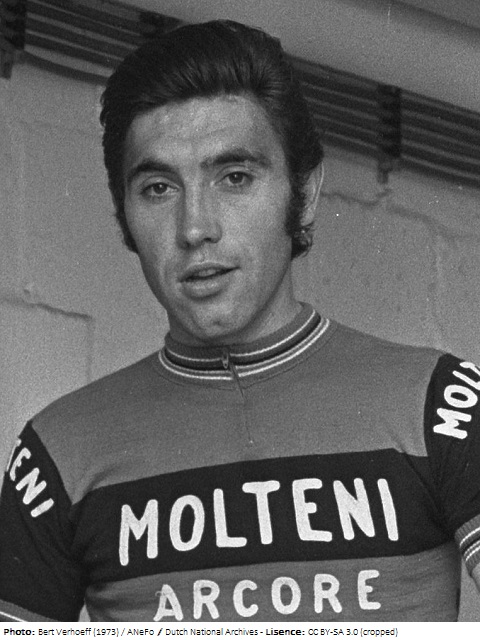
Biographical information
Eddy Merckx is considered the greatest cyclist of all-time, and few argue with that assessment. He was so strong and rode hard so often that his nickname was “The Cannibal”. He had no weaknesses – he was the strongest time trialist and climber in the world, and could outsprint all but a few rivals. Although his list of major victories is impressive, it is almost more impressive when one considers the records he holds for victories in major races. At his retirement he had won the most titles, or equal most, in the Tour de France (5), Giro d’Italia (5), World Championship road race (3), Milano-Sanremo (7), Gent-Wevelgem (3), La Flèche Wallonne (3), and Liège-Bastogne-Liège (5), and in that list, only Merckx’s five Tour de France wins has been surpassed, intially by Lance Armstrong, with seven, prior to his doping disqualifications. Merckx won 19 monument races, the five greatest one-day classics, a record, with second on that list Roger De Vlaeminck , far back with 11. He is one of only three riders, with De Vlaeminck and Rik Van Looy , to have won all five of the monuments. Merckx’s seven victories at Milano-Sanremo is an absolute record for most victories at any major one-day classic.
Merckx was the first man (and since equalled only by Stephen Roche ) to win the Tour de France, Giro d’Italia and World Professional Road Race in the same year (1974). Only he, Jacques Anquetil , Felice Gimondi , Bernard Hinault, Alberto Contador , and Chris Froome have ever won all three of the grand tours – Tour de France, Giro d’Italia, and the Vuelta à España, but only Merckx won at the other major tour, the Tour de Suisse. At the 1969 Tour de France, Merckx performed the still unequalled feat of winning the yellow jersey (overall winner), green jersey (points winner), and polka-dot jersey (King of the Mountains), something that could not even be imagined today in the professional peloton. His 11 victories in the major tours is an all-time record and might have been greater. He rode the Tour de France only eight times, twice when past his prime, and in 1973, because he was so dominant, he was asked by Tour organizers not to race because they felt his dominance was ruining the Tour.
Merckx is credited with over 500 major professional wins during his career. His grand tour wins were as follows: 1969-72, 1974 Tour de France; 1968, 1970, 1972-74 Giro d’Italia; 1973 Vuelta à España; and the 1974 Tour de Suisse. He also won the following other jerseys in grand tours: mountain classification – 1969-70 Tour de France; 1968 Giro d’Italia; points classification – 1969, 1971-72 Tour de France; 1968, 1973 Giro d’Italia; and the 1973 Vuelta à España. Merckx’s three victories in the World Professional Road Race came in 1967, 1971, 1974, but he also won the World Amateur Championship on the road in 1964. In 1972, he set the World Hour Record, recording 49.431 km (30.722 miles) in Mexico City. That mark was broken in 1984 by Francesco Moser, but by then new bike technology had taken over, and subsequent hour marks were often due to improved bike design as much as the riders’ abilities. The UCI eventually reverted to a “standard” bike classification, and with that new classification, Merckx’s hour record was not bettered until 2000, and then by Chris Boardman riding only 10 metres further.
In other lesser tours and one-day classics, Merckx’s victories can be summarized as follows: Milano-Sanremo – 1966-67, 1969, 1971-72, 1975-76; La Flèche Wallonne – 1967, 1970, 1972; Gent-Wevelgem – 1967, 1970, 1973; Paris-Roubaix – 1968, 1970, 1973; Liège-Bastogne-Liège – 1969, 1971-73, 1975; Ronde van Vlaanderen – 1969, 1975; Paris-Nice – 1969-71; Dauphiné-Libéré – 1971; Midi-Libre – 1971; Het Volk – 1971, 1973; Giro di Lombardia – 1971-72; Paris-Brussels – 1973; Grand Prix des Nations – 1973; Amstel Gold Race – 1973, 1975.
Merckx was not without his detractors. He was criticized by other riders because he never let up, always riding to win, often not giving lesser riders a chance to shine a bit. And he tested positive for drugs three times, in an era in which the doping penalties were less stringent. In retirement, though, he remains the all-time Belgian sporting legend, being voted Belgium’s Sportsman of the 20th Century, and he was made a Baron by Albert II, King of Belgium in 1996. Merckx’s son, Axel , later became a professional cyclist, though not with the success of his father, although he did win a bronze medal in the Olympic road race in 2004.
Olympic family relations
- Father of Axel Merckx
- Grandfather of Luca Masso

Special Notes
- Listed in Olympian Members of the Nobility (Baron)
- Listed in Olympians Who Were Elected Belgian Athlete of the Year (1969, 1970, 1971, 1972, 1973, 1974)
- Listed in Olympic Order Recipients (1995 (Silver))
- Subscribe to newsletter
It's going to be so great to have you with us! We just need your email address to keep in touch.
By submitting the form, I hereby give my consent to the processing of my personal data for the purpose of sending information about products, services and market research of ŠKODA AUTO as well as information about events, competitions, news and sending me festive greetings, including on the basis of how I use products and services. For customer data enrichment purpose ŠKODA AUTO may also share my personal data with third parties, such as Volkswagen Financial Services AG, your preferred dealer and also the importer responsible for your market. The list of third parties can be found here . You can withdraw your consent at any time. Unsubscribe
The Fall of Eddy Merckx, One of the Greatest Tour de France Champions

Coming into the 1975 Tour de France, Eddy “the Cannibal” Merckx seemed invincible. He won the last five Tours he entered and was the favourite to win again and claim his 6 th title. But an unexpected turn of events changed the trajectory of one of the greatest cycling champions.
Merckx’s 1975 season was looking great, he won four classics that spring. His Belgian reign has been so strong that he was getting threatening letters from the French fans. The message was always similar:
“If you win again, bad things are going to happen to you.”
Eddy Merckx wasn’t intimidated. He considered these letters to be motivation and was fired up to claim another victory at the Tour. After stage 6, he was leading the 1975 Tour with 31 seconds ahead of the young Italian star Francesco Moser. He was off to a good start after that first time trial. But his true rival was ready to strike when they entered the Pyrenees.

Bernard Thévenet was riding his 6 th Tour in 1975 and after finishing in second place two years prior, he was determined to bring the championship back to France. A month before the Tour, he won Critérium du Dauphiné, which gave him further confidence that he had what it takes to bring down the Cannibal.
Thévenet, along with another experienced Tour competitor Joop Zoetemelk, was able to drop Merckx during the “Circle of Death”, the hardest Tour de France stage in the Pyrenees Mountains. Merckx showed first signs of vulnerability but was still leading by 1 minute and 31 seconds four days later at the start of the climb to Puy de Dôme.
Around 4 km into the 12 km Puy de Dôme climb, Thévenet was in the lead pursued by an excellent climber Lucien Van Impe. Merckx was chasing them, slowly closing the gap. He was alone making his way through hordes of fans lining the road. And then… it happened. One of the spectators punched Merckx in the side where the right kidney is.
Merckx clutched his belly in pain but kept on pedalling. He completed the stage 34 seconds after Thévenet and vomited after crossing the finish line.
The attacker was eventually found, his name was Nello Breton. He claimed it was an accident and that he was pushed and fell onto the road on the rider. Merckx later sued Breton. The court found him guilty but sentenced him only to pay a symbolic fine of 1 franc.
At the end of this dramatic 14th stage, Merckx maintained a 58-second lead. Unfortunately, the doctors found that he had a mild kidney inflammation. Merckx had to be treated with pain medication and blood thinners as well. His chances for the rest of the Tour were not looking good.
After the rest day, Merckx had to face Thévenet at stage 15 that included five brutal Alpine climbs. They fought non-stop trying to find each other’s weaknesses. The Frenchmen had an unlucky flat, which set him back and he became the pursuer chasing Merckx. At the beginning of the final climb to Pra-Loupe, Merckx was ahead by a whole minute. All was looking great for the defending champion.

With around 4 km left till the top of the climb, Merckx broke. He later described it as going from sober to fully drunk in a matter of seconds. Only this was not caused by alcohol but the long breakaway and the medical treatment to solve his kidney issues during the rest day. He was barely able to spin the pedals with a painful grimace on his face, an empty look in his eyes, and a hunched posture.
The Italian Gimondi was the first one to catch up to Merckx and Thévenet quickly followed. Encouraged by what he saw, Thévenet pushed even harder and crossed the finish line in the first place 23 seconds ahead of Gimondi and almost 2 whole minutes ahead of Merckx. In one of the most memorable Tour de France stages, Bernard Thévenet managed to finally take the yellow jersey away from the Cannibal.
This victory gave the Frenchman wings! He flew over Izoard in the next stage and increased his lead to impressive 3 minutes and 20 seconds. The French fans were starting to celebrate the fall of Eddy Merckx. Even Merckx himself commented that Thévenet secured the win that day. Was he bluffing? There was one more mountain stage in the Alps left. There was still a chance for a comeback.
Merckx attacked from the starting line but luck was not on his side that day. He suffered a bad fall. He was bleeding, had a banged-up knee and hip, and a broken cheekbone and jaw, which was only discovered later. Despite this, he got back on his bike and kept fighting. He was refusing medical attention. Somehow, he managed to finish only 2 seconds after Thévenet.
Doctors suggested Merckx should drop out due to the severity of his injuries. He was only able to take in liquid food, unable to chew with his broken jaw. Merckx decided to continue despite the warnings. He later expressed regret saying that continuing with those injuries likely cut his career short.

Merckx said his suffering was unimaginable for the rest of the Tour. He was severely under-fuelled and in constant pain. He was only able to continue because of how important Tour was to him and because of his team colleagues. His colleagues’ bonuses depended on Merckx’s general classification placement. He knew he could still finish in second place but his body paid the price. He later added that he should have quit and paid his domestiques with his own money.
The Tour de France was finishing at Champs-Élysées for the first time that year. It was quite symbolic as it marked the beginning of this tradition but also an end of the Merckx era. Bernard Thévenet claimed victory with a margin of 2 minutes and 47 seconds and the French president Valéry Giscard d’Estaing couldn’t be prouder congratulating a French champion on the podium.
“I tried everything and it wasn’t enough. The strongest one always wins and Thévenet was the strongest this time,” said Merckx showing class in defeat.
“Tell me who came in second behind you and I will tell you the value of your victory,” said Thévenet showing the respect he had for his rival.
Articles you might like

The La Vuelta Symbols You Never Knew
La Vuelta symbols are well recognised and beloved, and although they are not as famous as those of the Tour de France, they are still part of the cycling mythos. So, let’s have a look at La Vuelta’s symbols, their story, and their meaning.

Tackle A Route Made By Alberto Contador: Explore Madrid’s Anillo Verde and La Rioja’s Wine Region
To celebrate La Vuelta a España, let’s take a look at two of the most culturally and historically important regions of the country of Spain – the capital city of Madrid and La Rioja, one of the least populated but most beautiful parts of the…

Van Aert Wins Third Vuelta Stage and Takes Control of the Škoda Green Jersey Race
Wout van Aert is definitely back to his best form. Visma–Lease a Bike’s superstar all-rounder proved that on stage 10 of the Vuelta a España, when he was the instigator and driving force of a long breakaway that was allowed by the peloton to reach…

George Bennett Reflects on Challenging Vuelta a España Breakaway: ‘It was horrible, no one helped us’
George Bennett expressed both admiration for his teammates and frustration over the dynamics of a challenging breakaway during stage 11 of the Vuelta a España. Despite the concerted efforts of his team, Israel-Premier Tech, which included himself, Marco Frigo, Matthew Riccitello, and Corbin Strong, Bennett’s…
Eddy Merckx and the 1975 Tour de France
To mark Eddy Merckx's 70th birthday, we look back on one of the defining races of his career: the brutal, tumultuous 1975 Tour de France. Ultimately he was beaten, but the memory of a classic race will never fade
- Sign up to our newsletter Newsletter
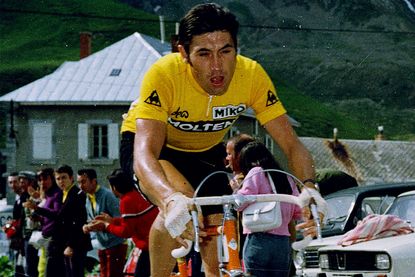
The best cyclist ever to grace two wheels, Eddy Merckx turns 70 today, and to mark the occasion, we have released an ultimate guide to The Cannibal, which you can order now. It takes a whole magazine to look back at his life on the bike, but here we're looking back at a single defining time in the great man's career: his defeat in the 1975 Tour de France.
Perhaps it seems perverse to suggest the 1975 Tour de France was one of the high spots of Merckx 's career. After all, this was the year he suffered his first defeat in the Tour de France. He was also attacked by a spectator and injured his face in a fall.
But being a champion isn't just about winning. It's also about pride in performance, loyalty to team-mates and a bloody-minded refusal to accept defeat. Those were some of the qualities displayed by Merckx in the Tour of 1975.
The Belgian had rampaged his way through that year's spring Classics, scoring his sixth win in Milan-San Remo , winning the Tour of Flanders for the second time and Liège-Bastogne-Liège for the fifth time. In addition, he placed second in Paris-Roubaix .
He might have triumphed at Roubaix had he not punctured with a few kilometres to go. "I rode like a man possessed to catch the leaders, but by the time I rejoined them Roger De Vlaeminck was away," Merckx recalled.
With this kind of form, Merckx looked a good bet to add another Tour de France to the five he had won already - although, in public at least, he insisted he had no desire to beat the all-time record he held jointly with Jacques Anquetil. "The idea doesn't interest me very much because then people would want me to go for a seventh and then an eighth," he said.
Tour heroes
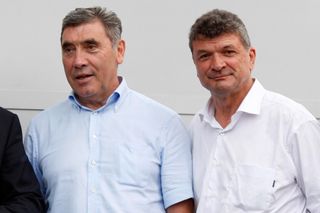
Just three riders wore the yellow jersey in the 1975 Tour, each of them a star name in his own right. Francesco Moser won the prologue at Charleroi and stayed in yellow until stage five. Then, in the first time trial held over 16 kilometres at Merlin Plage, Merckx put 30 seconds into Moser and donned the maillot jaune.
Get The Leadout Newsletter
The latest race content, interviews, features, reviews and expert buying guides, direct to your inbox!
The race headed south to Bordeaux, where Britain's Barry Hoban was the stage winner, and on to Auch, where Merckx again proved he was master against the watch. Merckx won the 37-kilometre time trial from Bernard Thévenet, who was only nine seconds down, a portent of the challenge to come.
Felice Gimondi and Joop Zoetemelk took the main stages in the Pyrenees and the lamented Gerrie Knetemann won at Albi.
The race finish in Paris was just over a week away as the peloton embarked on stage 14, a mountain time trial, which finished on the 1,400-metre summit of the Puy de Dôme.
Merckx, still in yellow, was battling up the climb when, almost within sight of the finish, a French spectator emerged from the crowd and punched Merckx in the stomach .
"I was about to catch Zoetemelk on the climb," Merckx recalled. "The blow winded me and I took a long time to get my breath back."
Merckx was clearly in distress at the finish, whether from the shock of the assault or the effort of the climb, it was impossible to say.
Later, Merckx would claim that the punch on the Puy de Dôme cost him his chance of becoming the first six-time winner of the Tour. However, after the time trial stage, he was still in yellow, with Thévenet hovering less than a minute down.
Following a rest day, battle resumed with a mountain stage from Nice to Pra Loup. Merckx attacked and dropped Thévenet on the Col d'Allos. As he raced towards the final climb, his hold on the yellow jersey looked to be safe for another day.
But then Merckx blew up in sensational style on Pra Loup. Thévenet, who thought his chance of victory had disappeared, gained new heart as word of the Belgian's collapse spread down the mountain. In a memorable confrontation, the Frenchman caught a suffering Merckx two kilometres from the summit.
Yellow no more
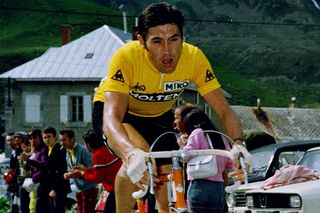
By the time he crossed the stage finish line, Thévenet had turned a one-minute deficit at the foot of Pra Loup to a two-minute advantage at the top.
Merckx had worn the yellow jersey for the last time in his career. He claimed that his breakdown on Pra Loup was caused by medication he had taken to alleviate the effects of the thump he had received on the Puy de Dôme.
As if empowered by the yellow jersey on his back, Thévenet produced the ride of his life next day on the Col d'Izoard. The moonlike landscape of the Izoard was the setting for Thévenet's epic as he put two minutes into Merckx, which virtually assured him of victory in Paris.
Merckx meanwhile ran into more trouble before the stage 17 start in Valloire. Riding to the start he collided with Denmark's Ole Ritter and fell on his face, breaking a cheekbone.
He still rode an aggressive stage, in the vain hope of dethroning Thévenet. But as the days went by, the pain grew worse and he had difficulty eating.
The Tour doctor advised him to abandon, but Merckx was determined to reach Paris no matter what the cost. He was also aware that had he pulled out of the Tour it would have left his loyal team-mates a lot poorer. Without Merckx's second-place prize money and the cash he picked up in the points, mountains and team classifications, the Molteni men would have had little to show for their three weeks' hard labour.
Later, Merckx would say his decision to continue in the Tour was "really stupid. It was a mistake that helped to cut short my career."
Merckx kept on attacking all the way to the Champs-Elysées. But the Tour had been a lost cause since the Alps, where Merckx had suffered his first serious defeat and Thévenet had opened a lead of almost three minutes.
>>> Cycling Legends: the ultimate guide to Eddy Merckx – pre-order your copy now
Show us your scars #3: Bernard Hinault
Thank you for reading 20 articles this month* Join now for unlimited access
Enjoy your first month for just £1 / $1 / €1
*Read 5 free articles per month without a subscription
Join now for unlimited access
Try first month for just £1 / $1 / €1
Follow on Twitter: @richwindy
Richard is digital editor of Cycling Weekly. Joining the team in 2013, Richard became editor of the website in 2014 and coordinates site content and strategy, leading the news team in coverage of the world's biggest races and working with the tech editor to deliver comprehensive buying guides, reviews, and the latest product news.
An occasional racer, Richard spends most of his time preparing for long-distance touring rides these days, or getting out to the Surrey Hills on the weekend on his Specialized Tarmac SL6 (with an obligatory pub stop of course).
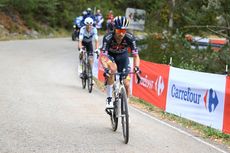
Wout van Aert takes a clear lead in the king of the mountains competition
By Vern Pitt Published 30 August 24
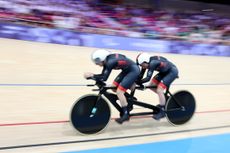
Six Paralympic medals won by GB in velodrome on Friday
By Adam Becket Published 30 August 24

Tadej Pogačar has now officially joined the club, becoming the eighth man to achieve one of professional cycling’s most sought after accolades
By Tom Thewlis Published 22 July 24
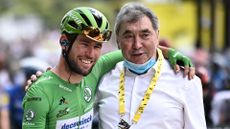
Greatness recognizes greatness, and there is absolutely no respect lost between cycling legends Eddy Merckx and Mark Cavendish.
By Anne-Marije Rook Published 3 July 24
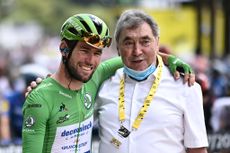
The 'Manx Missile' equalled the great Belgian's record at the Grand Boucle as he won four stages
By Tim Bonville-Ginn Published 10 December 21
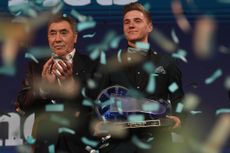
The cycling legend has happily voiced his opinion on the young Belgian multiple times during the rider's short career
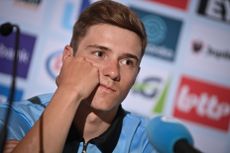
Merckx recently spoke out against the young Belgians selection for the World Championships road race
By Tim Bonville-Ginn Published 24 September 21
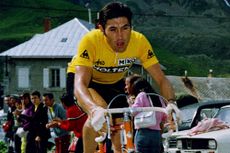
How the Cannibal trained to get ready for his first Tour de France win in the 1969 edition of the race
By Chris Sidwells Published 11 December 19
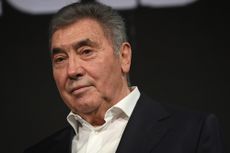
The Belgian is still not yet one hundred per cent better after his accident in October
By Jonny Long Published 5 December 19
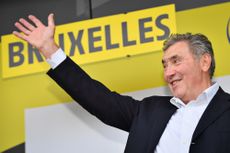
The 74-year-old was taking part in his regular Sunday bike ride with friends before falling
By Jonny Long Published 15 October 19
Useful links
- Tour de France
- Giro d'Italia
- Vuelta a España
buyers-guides
- Best road bikes
- Best gravel bikes
- Best smart turbo trainers
- Best cycling computers
- Editor's Choice
- Bike Reviews
- Component Reviews
- Clothing Reviews
- Contact Future's experts
- Terms and conditions
- Privacy policy
- Cookies policy
- Advertise with us
Cycling Weekly is part of Future plc, an international media group and leading digital publisher. Visit our corporate site . © Future Publishing Limited Quay House, The Ambury, Bath BA1 1UA. All rights reserved. England and Wales company registration number 2008885.
- Share full article
Advertisement
Supported by
Sports of The Times
Appetite for Racing, and for Winning
By George Vecsey
- Aug. 26, 2011
When the greatest champion of any sport comes to town, it seems like a good idea to take a look at him up close.
Babe Ruth isn’t coming around any time soon, as far as we know, and Michael Jordan is pretty ubiquitous from videos and commercials, but here was Eddy Merckx, the most successful cyclist of them all, just a few subway stops away.
The first thing that needs to be known about Merckx is how he got his nickname, the Cannibal . Actually, all cyclists look ferocious, with their formidable prehistoric-looking mandibles jutting below the wraparound sunglasses and new-age helmets.
Merckx, 66, rode before shades and helmets — riders swooped down mountains leading with their foreheads — and the naked look emphasized his insatiable eyes. From the mid 1960s to the mid ’70s, Merckx entered every race there was, from lowly midweek criterium to the major three-week tours. From 1970 through 1973, he won more than a third of the races he entered, a staggering percentage.
How did he get that nickname? Merckx flew in from Europe just for the party on Thursday evening celebrating the 50th birthday of Bicycling Magazine ; he is a friend of the Rodale family , which owns the magazine. He showed up at the soiree in SoHo — barrel-chested and broad-shouldered, still looking like the 6-foot, 163-pound beast who dominated cycling for a generation.
Speaking in English, Merckx recalled how he got his nickname in 1969, after his first Tour championship, when he also captured the green jersey for points leader and the King of the Mountain jersey (white with large red circles). An admiring Peugeot teammate, Christian Raymond, told his 12-year-old daughter that Merckx would not let anybody else win a single franc.
“Daddy, he’s a cannibal,” the girl said. The nickname grew after his retirement, when Bernard Hinault and Miguel Indurain matched Merckx and Jacques Anquetil with five championships . Then Lance Armstrong won seven straight, from 1999 to 2005. They are very close, Merckx and Armstrong. When Armstrong was recovering from cancer, Merckx visited him in Texas.

“When you put down résumés of our careers side by side on two pieces of paper, his successes were incredible,” Armstrong told Alastair Campbell of The Times of London in 2004. “They were so diverse: Tours, world championships, one-hour records — he was an animal.” Armstrong did have one caveat: the quality and depth of riders are greater today, he said.
Armstrong, who has never officially tested positive for doping, is currently the target of a grand jury for his testimony about drugs. Merckx was disqualified from the Giro d’Italia in 1969 for using a stimulant and tested positive several other times.
The definitive word on this sport still comes from the offhand remark by Anquetil of France, who once asked, “Do they expect us to ride the Tour on Perrier water?”
Asked about the long history of drugs in cycling, Merckx said that in his day there were “products that made you a little less tired.” Nowadays, he said, there are products that “make you better.”
What does he think of the epidemic of positive tests in the last generation?
“It comes from the doctors; they make money,” he said.
He praised the upgraded testing in recent years and said the sport was now cleaner than many others.
For all that, cycling remains a compelling sport. Armstrong gained his desire from a hard childhood. Asked what made him tick, Merckx said his father was one of 11 children, his mother one of seven, and the parents ran a grocery store outside Brussels and raised three children.
“We were not rich,” he said. “We did not go to the Cote d’Azur or skiing. Our only vacation was to the North Sea. I had to pay for my bicycle every month, but we always had food.”
He was hungry in the way champions often are — the seething drive of Jim Brown, the bland glare of Gordie Howe, the cut-your-heart-out look of Mia Hamm. Merckx was always in motion somewhere. Whereas Armstrong and his team could spend an entire year preparing for the Tour de France, Merckx raced everywhere.
The lucrative Tour today is laced with arcane courtesies — popular racers win stages in their home regions; French riders (it has come to this) do well on the Quatorze, Bastille Day. Win the Tour, with a fantastic team around you, and you have had a great year. Not so in the time of Eddy Merckx.
“The smaller races were where you made your money,” he said the other day.
From 1969 through 1972, Merckx won the Tour de France, but he did not enter the race in 1973. The other day he explained: “I had the opportunity to win in Spain and Italy” — which he did — “and we only had 16-17 riders on our team, so it was not easy for them.”
Plus, as a thoroughly bilingual Belgian — who does not take sides in the schism between the Flamands and Walloons — he was most emphatically not a French citizen. So in 1973 it seemed prudent to abstain. The next year he won his fifth, and probably would have won a sixth, except that near the end of a mountain stage in 1975 he was sucker-punched by one of the thousands of spectators who clog the narrow mountain climbs.
“He hit me in the liver,” Merckx said, patting his right front abdomen. (Some stories claim he was hit in the kidneys, in the back, but Merckx would know.)
He finished third, 34 seconds out, and never won the Tour again. His total of victories is usually put at 450 races — not stages — and he did it all after injuring his back in 1969, an injury he felt for the rest of his career, and into today. Yes, he still rides.
Merckx resists comparisons with the other champions, saying: “You can only be the best of your time. I was the best of my time.”
Perhaps because of the mercantile background of his family, Merckx showed an aptitude for business, manufacturing his own line of bicycles for many years. There is now a Merckx model in the Gita brand, and he still makes suggestions for streamlining, but will not sacrifice safety for lighter weight. He has seen friends die for lack of security, he said somberly. He divides his time between Brussels (a subway stop is named after him) and Monaco, and brags about his son Axel , who rode in the Tour, and his daughter, and the five athletic grandchildren.
Merckx followed the recent Tour and respects Cadel Evans, the Australian, for winning, but he could not resist adding that Evans was not a versatile champion who could win stages under many conditions. Back in the day, there was financial incentive to win every stage, every race, from spring to fall. That made a rider hungry. Made him the Cannibal.
E-mail: [email protected]
Cycling Around the Globe
The cycling world can be intimidating. but with the right mind-set and gear you can make the most of human-powered transportation..
Are you new to urban biking? These tips will help you make sure you are ready to get on the saddle .
Whether you’re mountain biking down a forested path or hitting the local rail trail, you’ll need the right gear . Wirecutter has plenty of recommendations , from which bike to buy to the best bike locks .
Do you get nervous at the thought of cycling in the city? Here are some ways to get comfortable with traffic .
Learn how to store your bike properly and give it the maintenance it needs in the colder weather.
Not ready for mountain biking just yet? Try gravel biking instead . Here are five places in the United States to explore on two wheels.
Giro d'Italia: The Merckx years
A photo gallery of the Giro in the early seventies
As the 2011 Giro d'Italia draws near, Cyclingnews breaks into the archives with a look back at the last four decades of racing – the dominant performers, personalities, controversies and memorable moments. We kick off with the 1970's and the career of Eddy Merckx.
Giro d'Italia: Anglophone Invasion
Eddy Merckx was the first Belgian to win the Giro d’Italia in 1968 and went on to win the Corsa Rosa five times. Only Italian cycling legends Alfredo Binda and Fausto Coppi have also won the Giro five times but neither also won the Tour de France five times like Merckx did.
Merckx won his five Giri d’Italia in 1968, 1970, 1972, 1973 and 1974. He also won the points jersey in 1968 and 1973, the climber’s jersey in 1968 and 24 stages during his career.
He often battled with Italian rival Felice Gimondi for the maglia rosa. His defeat of then rising Italian star Gianbattista Baronchelli in 1974 is remembered as one of the great fights in the history of the Giro.
Merckx was always proudly Belgian but considered Italy his cycling home. He raced for the Molteni team and still speaks the language fluently. He moved from Peugeot to Faema in 1968 and riding for the Italian coffee machine maker meant the Giro d’Italia was initially a bigger goal than the Tour de France. He had made his Giro debut in 1967, winning two stages and finishing ninth overall behind Gimondi.
The year after Merckx beat Vittorio Adorni and Gimondi with a dominant ride. He pulled on the maglia rosa for two stages early in the race and then won on Tre Cime di Lavaredo to take back the race lead from Michele Dancelli. He kept it for 11 days and rode triumphantly into Naples.
Savona doping scandal
Get The Leadout Newsletter
The latest race content, interviews, features, reviews and expert buying guides, direct to your inbox!
Merckx won his first Tour de France in 1969 but two months before he had left the Giro d’Italia in disgrace after testing positive for the stimulant Reactivan in Savona. An interview with a tearful Merckx lying on his hotel bed dressed in his cycling clothing was shown on Italian television and Merckx has always protested his innocence, claiming his urine samples and the tests were not handled correctly.
Merckx was eventually cleared of any wrong doing after by the UCI but it left a stain on his Giro d’Italia record, even if he returned to win the Giro in 1970, beating Gimondi yet again. He beat José Manuel Fuente to win the 1972 Giro and then dominated the 1973 edition of the race that began in Verviers, near Liege in Belgium. Merckx won the opening two-up time trial with Roger Swerts and kept the pink jersey all the way to the finish in Trieste, beating Gimondi by 7:42. Belgian riders won 13 stages that year, with Merckx taking six of them. By then he had joined the Molteni team sponsored by the Lombardy-based food company.
Merckx beat Baronchelli to win the 1974 Giro by just 12 seconds –the second smallest winning margin in the history of the race, and the tifosi remember the battle of nerve and climbing ability between the Cannibal and ‘Gibi’, who had won the amateur Giro d’Italia and the Tour de l’Avenir in 1973 and was a 21 year-old neo-pro.
Merckx took the pink jersey after the Forte dei Marmi time trial and looked to dominate in the mountains. However Baronchelli went after Fuentes on the slopes of the Tre Cime di Lavaredo and Merckx was unable stay with him. Italy went wild cheering him on, thinking Merckx had been defeated. But he dug deep to find something to be able to limit his losses and hang on to the pink jersey. Three days later he was crowned winner the winner of his fifth and final Giro d’Italia, while Baronchelli would never recover and show his true potential. However Merckx’s reign was also ending. He won the 1974 Tour de France but failed to win a sixth Tour de France. He rode the 1976 Giro d'Italia with Molteni but was only eighth, more than seven minutes brehind long-time rival Gimondi, who won his third Giro.

Thank you for reading 5 articles in the past 30 days*
Join now for unlimited access
Enjoy your first month for just £1 / $1 / €1
*Read any 5 articles for free in each 30-day period, this automatically resets
After your trial you will be billed £4.99 $7.99 €5.99 per month, cancel anytime. Or sign up for one year for just £49 $79 €59
Try your first month for just £1 / $1 / €1
Stephen is the most experienced member of the Cyclingnews team, having reported on professional cycling since 1994. He has been Head of News at Cyclingnews since 2022, before which he held the position of European editor since 2012 and previously worked for Reuters , Shift Active Media , and CyclingWeekly , among other publications.
Primož Roglič looks like red jersey-elect after crushing Vuelta a España display at Puerto de Ancares - Analysis
Analysis: Why is the 2024 Vuelta a España so wide open?
Wout van Aert adds Vuelta a España mountains jersey to points classification lead on Puerto Ancares
Most Popular

IMAGES
VIDEO
COMMENTS
At the Tour, Merckx won the race's prologue, giving him the first race leader's maillot jaune (English: yellow jersey), [141] which he lost the next day to teammate Joseph Bruyère. [142] ... Merckx (pictured in August 1973) was a successful cyclist on the road and on the track, with a record of 525 victories to his credit over the course of ...
The 1973 Tour de France was the 60th edition of the Tour de France, one of cycling's Grand Tours.It took place between 30 June and 22 July, with 20 stages covering a distance of 4,090 km (2,541 mi). Eddy Merckx, winner of the previous four editions, did not start the 1973 Tour, partly to avoid angry French fans and partly to please his sponsor; instead he rode and won the 1973 Vuelta a España ...
As the Tour de France marks fifty years since The Cannibal's first Tour Victory, inCycle looks at what made Eddy Merckx the greatest cyclist of all time. Wit...
Eddy Merckx (born 1945-06-17 in Meensel-Kiezegem) is a former professional road racing cyclist from Belgium, active between 1964 and 1978. ... His best results are 5 wins in GC Tour de France and 34 stage wins in Tour de France. ... 1973. Molteni. 1972. Molteni. 1971. Molteni. 1970. Faema - Faemino. 1969. Faema. 1968. Faema. 1967. Peugeot ...
Eddy Merckx is a Belgian champion bicycle racer, arguably the greatest professional rider ever. ... 1971-73, 1975), the Tour of Flanders (1969, 1975), the Amstel Gold Race (1973, 1975), and the Tour of Lombardy (1971-72). After retiring as a racer in 1978, Merckx opened a bicycle factory near Brussels that designs and supplies custom ...
In 1973 after four straight Tour wins, all time cycling great Eddy Merckx opted not to race - preferring to for a Giro d'Italia-Vuelta a España double - whilst two top Italians, reigning World ...
Eddy Merckx: The Greatest Cyclist of the Twentieth Century, (Boulder: VeloPress, 1996). Originally published in the Late Summer 2019 edition of Cycling West magazine. On June 28, 1969, a young Belgian cyclist, dressed in the white and red colors of the Faema squad and wearing dossard #51, took his place on the start-line of the 56th Tour de ...
Merckx is credited with over 500 major professional wins during his career. His grand tour wins were as follows: 1969-72, 1974 Tour de France; 1968, 1970, 1972-74 Giro d'Italia; 1973 Vuelta à España; and the 1974 Tour de Suisse.
1973 Tour de France Quick Facts: 4,140.4 km raced at an average speed of 33.918 km/hr. 132 starters and 87 classified finishers. After winning both the Vuelta and the Giro in 1973, Eddy Merckx chose not to defend his Tour title. His contract with sponsor Molteni called for his riding both the Giro d'Italia and the Vuelta a España (then held in ...
The 1973 Tour de France was the 60th edition of the Tour de France, one of cycling's Grand Tours. It took place between 30 June and 22 July, with 20 stages covering a distance of 4,090 km . Eddy Merckx, winner of the previous four editions, did not start the 1973 Tour, partly to avoid angry French fans and partly to please his sponsor; instead he rode and won the 1973 Vuelta a España and the ...
The reality is that the Eddy Merckx of 2016 is not the Eddy Merckx of the 1970s. He's now 71 years old. Eddy Merckx is an old man. Wrinkles and creases now frame his famous features. Not that it ...
The 28th Edition Vuelta a España (Tour of Spain), a long-distance bicycle stage race and one of the 3 grand tours, was held from April 26 to May 13, 1973.It consisted of 17 stages covering a total of 3,061 km, and was won by Eddy Merckx of the Molteni cycling team.As Merckx had already won several editions of the Tour de France and the Giro d'Italia with his win in the Vuelta, he became the ...
He rode the Tour de France only eight times, twice when past his prime, and in 1973, because he was so dominant, he was asked by Tour organizers not to race because they felt his dominance was ruining the Tour. Merckx is credited with over 500 major professional wins during his career.
Eddy Merckx leads Roger De Vlaeminck at the 1973 Paris-Roubaix with Merckx wining the race for a third time ... Merckx made his grand tour debut at the 1967 Giro d'Italia as he finished in ninth ...
Interview from Danish TV, with the legend Eddy Merckx. He talks about his best memories from his years riding and of course winning the Tour de France.Danish...
Thévenet, along with another experienced Tour competitor Joop Zoetemelk, was able to drop Merckx during the "Circle of Death", the hardest Tour de France stage in the Pyrenees Mountains. Merckx showed first signs of vulnerability but was still leading by 1 minute and 31 seconds four days later at the start of the climb to Puy de Dôme.
Merckx and Thevenet at the 2009 Tour de France. Photo: Yuzuru Sunada. Just three riders wore the yellow jersey in the 1975 Tour, each of them a star name in his own right. Francesco Moser won the ...
Giro di Sardegna (1968, 1971, 1973, 1975) Tour de Romandie Volta a Catalunya Paris-Luxembourg (1969) Paris-Nice (1969, 1970, 1971) Vuelta a Levante (1969) ... Merckx won the equivalent of a race a week for six years. [6] This table shows his strike rate of wins as a percentage of races undertaken. [5] Year Races Won Percentage 1961: 14: 1:
From 1969 through 1972, Merckx won the Tour de France, but he did not enter the race in 1973. The other day he explained: "I had the opportunity to win in Spain and Italy" — which he did ...
Le Tour de France 1973 est la 60 e édition du Tour de France, course cycliste qui s'est déroulée du 30 juin au 22 juillet 1973. ... Eddy Merckx est le grand absent de ce Tour. 12 formations de 11 coureurs prennent le départ à Schéveningue aux Pays-Bas.
Merckx won his five Giri d'Italia in 1968, 1970, 1972, 1973 and 1974. He also won the points jersey in 1968 and 1973, the climber's jersey in 1968 and 24 stages during his career.
Jesús Luis Ocaña Pernía (pronounced [xeˈsus ˈlwis oˈkaɲa peɾˈnia]; 9 June 1945 - 19 May 1994) was a Spanish road bicycle racer who won the 1973 Tour de France and the 1970 Vuelta a España.During the 1971 Tour de France he launched an amazing solo breakaway that put him into the Yellow Jersey and stunned the rest of the main field, including back to back Tour champion Eddy Merckx ...
Grand Tour (tudi Tritedenska dirka) je ime za tri najpomembnejše in najprestižnejše etapne dirke v kolesarstvu: Dirko po Franciji ... 1973: Eddy Merckx : Luis Ocaña : Eddy Merckx : 1974: Eddy Merckx : Eddy Merckx : José Manuel Fuente : 1975: Fausto Bertoglio : Bernard ...
In road bicycle racing, a Grand Tour is one of the three major European professional cycling stage races: Giro d'Italia, ... 1973: Eddy Merckx : Luis Ocaña : Eddy Merckx : 1974: Eddy Merckx : Eddy Merckx : José Manuel Fuente : 1975: Fausto Bertoglio : Bernard ...